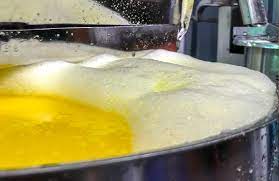Antifoam
Antifoam, also known as defoamer or antifoaming agent, is a chemical additive used to prevent or reduce the formation of foam in industrial processes.
Foam can be problematic in various applications, such as in the production of food and beverages, pharmaceuticals, wastewater treatment, and various chemical processes.

Foaming can occur due to the presence of surfactants, proteins, or other substances that stabilize the foam. Antifoam agents work by breaking down or destabilizing the foam, preventing its formation or causing it to collapse.
This material agents come in various forms, including liquids, powders, and emulsions. They are added in small amounts to the process where foam is undesirable. The choice of antifoam depends on the specific application and the nature of the substances causing foam.
Common industries that use antifoam agents include
Food and Beverage Processing: In the production of beverages like beer, soft drinks, and fruit juices, This material agents help control foam during fermentation and processing.
Pharmaceutical Manufacturing: This product agents are used in pharmaceutical processes where foaming can affect the quality of the final product.
Wastewater Treatment: In wastewater treatment plants, antifoam agents are employed to control foam in aeration tanks and other treatment processes.
Pulp and Paper Industry: This product agents are used in the papermaking process to control foam in pulp washing and paper coating.
Chemical Processing: Various chemical manufacturing processes may produce foam, and antifoam agents are used to mitigate these effects. It’s important to note that while This product agents are effective in controlling foam, their selection and dosage must be carefully considered to avoid any adverse effects on the desired process or product.


